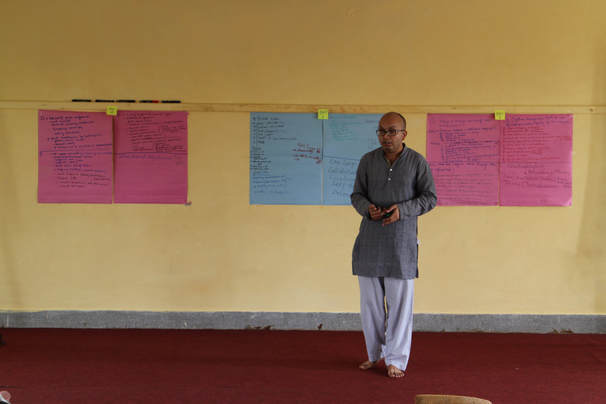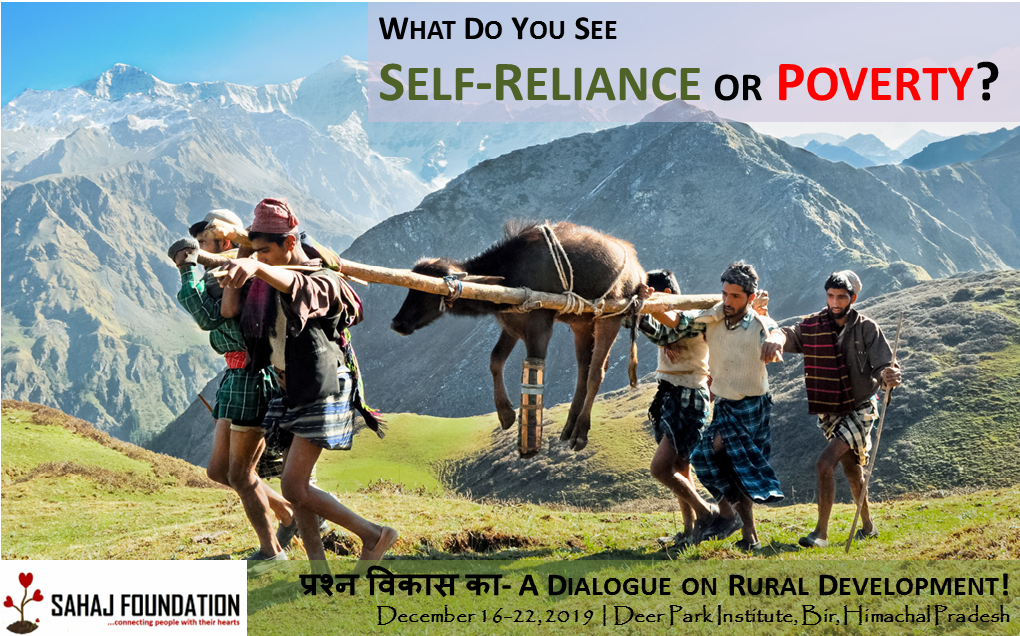प्रश्न विकास का- A DIALOGUE ON RURAL DEVELOPMENT!
December 16-22, 2019 | Open only for college students (UG/PG courses) and for Civil Services Aspirants
OBJECTIVE
To understand 'Development' by questioning its basics.
BACKGROUND
The present world is aggressively talking about development. Be it the social media, corporate board meetings, government panels, public forums or international dialogues, everywhere ‘Development’ has taken the center-stage, making people come up with innovative ideas, inclusive frameworks, diverse teams and multi-dimensional strategies to solve age-old as well as newly found problems. More and more people are now thinking beyond their individual selves to participate in the whole social process of solving human challenges across the world. There are now people who volunteer on weekends, and there are people who have dedicated their whole lives for the betterment. Though the transition is extraordinary, it also comes with its limitations if proper ‘preparation’ is not done before ‘action’.
The process of preparation requires us to ask a few basic questions:
‘प्रश्न विकास का’ is a dialogue meticulously designed for asking all these questions one by one in rural context and for reflecting on them collectively, both while being in a circle and while being on-field talking to villagers about their life experiences. On one hand, the dialogues shall try to find new answers to its central questions, and on the other, the dialogue shall also try to re-evaluate the direction of development we have taken so far as a society. In the process, the dialogue shall consider ideas like ‘Localization’, ‘Self-reliance’, ‘Globalization’, ‘Industrialization’, ‘Governance’ while keeping in mind the modern tools such as ‘Technology’, ‘Education’, ‘Tourism’, ‘Entrepreneurship’, 'Money' etc.
The dialogue comes with a very participatory, experiential and simplistic approach. There would not be any experienced person or role model from rural development field to influence our thinking. We would all be on our own doing the unlearning, re-learning, forming theories and experiencing realities while being on-field. We will get our chances to explore the modern upcoming village of Bir and also spend time with villagers who have consciously chosen to maintain their traditional lifestyles. Furthermore, during the intense process of understanding villages, we shall also take the help of silence, meditation, reflection and documentaries. In the end, our intention would be to come up with our own understanding of how the villages should be ‘developed’ so as to maximize collective happiness and harmony.
The process of preparation requires us to ask a few basic questions:
- What do we mean by development? How exactly do we define it?
- Why do we need development? Is it essential to follow this path, or is it optional but we consider it essential?
- If we need development, how do we decide the direction of development? For example, development may mean eating packaged machine-based food, and it may also mean eating self-grown home-made food.
- While we decide the direction of development, how do we consider our relationships with each other and with plant, animal and material world?
- Lastly, thinking beyond Roti, Kapda, Makaan, Bijli, Paani and other essentials, what are the intangible outcomes of development that may give meaning to our existence on this planet?
‘प्रश्न विकास का’ is a dialogue meticulously designed for asking all these questions one by one in rural context and for reflecting on them collectively, both while being in a circle and while being on-field talking to villagers about their life experiences. On one hand, the dialogues shall try to find new answers to its central questions, and on the other, the dialogue shall also try to re-evaluate the direction of development we have taken so far as a society. In the process, the dialogue shall consider ideas like ‘Localization’, ‘Self-reliance’, ‘Globalization’, ‘Industrialization’, ‘Governance’ while keeping in mind the modern tools such as ‘Technology’, ‘Education’, ‘Tourism’, ‘Entrepreneurship’, 'Money' etc.
The dialogue comes with a very participatory, experiential and simplistic approach. There would not be any experienced person or role model from rural development field to influence our thinking. We would all be on our own doing the unlearning, re-learning, forming theories and experiencing realities while being on-field. We will get our chances to explore the modern upcoming village of Bir and also spend time with villagers who have consciously chosen to maintain their traditional lifestyles. Furthermore, during the intense process of understanding villages, we shall also take the help of silence, meditation, reflection and documentaries. In the end, our intention would be to come up with our own understanding of how the villages should be ‘developed’ so as to maximize collective happiness and harmony.
WHO SHOULD COME?
Those who wish to work or who are already working for the development of the villages in India in any field such as Education, Livelihood, Health, Technology etc. Also, please keep in mind that this dialogue shall focus on 'Why should we develop our villages?' and not on 'How should we execute our ideas?'. Therefore, this Dialogue shall not be an appropriate platform to talk about fundraising, execution, marketing, team building etc.
HOW WILL THE DIALOGUE HELP?
The dialogue shall help its participants to deeply understand the rural communities and to re-think about their working approach while looking at the same from a fresh perspective. The process aims to highlight the good practices and also the problems that may come up in future due to present projects/actions. In other words, the dialogue shall provide the participants an opportunity to re-evaluate their working strategies and fix the gaps, if any.
To understand more about how the Dialogue has helped its participants in the past, kindly explore the link here.
To understand more about how the Dialogue has helped its participants in the past, kindly explore the link here.
TIMELINE, BATCH SIZE AND VENUE
December 16-22, 2019 (7 Days | 9 AM - 9 PM | Last day finishes by 4 PM)
Around 12 participants
Deer Park Institute, Bir, District Kangra, Himachal Pradesh
Around 12 participants
Deer Park Institute, Bir, District Kangra, Himachal Pradesh
FINANCIALS
Rs 7,000 per participant. The cost covers program charges, basic dormitory accommodation, food and local travel expenses during the Dialogue.
Note: Selected Participants shall have to submit a non-refundable deposit of Rs 3,000 each in order to secure their space in the dialogue. The remaining contribution (Rs 4,000) may be submitted during the course of the dialogue.
Note: Selected Participants shall have to submit a non-refundable deposit of Rs 3,000 each in order to secure their space in the dialogue. The remaining contribution (Rs 4,000) may be submitted during the course of the dialogue.
FACILITATOR’S PROFILE

Ashish Kumar
Ashish graduated from Indian Institute of Technology (IIT), Roorkee in the field of Electrical Engineering in 2009. Post studies, he pursued his corporate career for a few years before deciding to move on to his passion to work with rural communities. Since then, Ashish has lived in the villages of Gujarat and Himachal Pradesh and worked for many rural projects related to Education and Livelihood sector. Before founding Sahaj Foundation in 2013, he also worked with Indian Institute of Technology (IIT) Mandi to help set up their ‘Centre for Innovative Technologies in Himalayan Region’.
Presently, Ashish lives a simple and peaceful life in Bir village situated in Kangra District of Himachal Pradesh. He has chosen Education as his primary medium of service while he continues to explore more on organic farming and holistic healing with an aim to simplify his lifestyle and benefit the society as much as possible.
Ashish’s journey of living with rural populace while understanding their needs took him deep within. Through his explorations and interactions, he realized that the concept of development needs rethinking so as to grasp the basics first before thinking about projects or policies. At personal level, Ashish has found simple living with minimum outer dependence for products of daily needs preferable to his lifestyle. In the whole process, he also realized that his life is more about purifying his inner self by serving people with great love in smaller ways than solving big issues or establishing large enterprises.
Ashish strongly believes that we need to create spaces wherein people can develop their abilities to think critically and understand the world by using their own experiences. This dialogue is an effort to do just that!
Ashish graduated from Indian Institute of Technology (IIT), Roorkee in the field of Electrical Engineering in 2009. Post studies, he pursued his corporate career for a few years before deciding to move on to his passion to work with rural communities. Since then, Ashish has lived in the villages of Gujarat and Himachal Pradesh and worked for many rural projects related to Education and Livelihood sector. Before founding Sahaj Foundation in 2013, he also worked with Indian Institute of Technology (IIT) Mandi to help set up their ‘Centre for Innovative Technologies in Himalayan Region’.
Presently, Ashish lives a simple and peaceful life in Bir village situated in Kangra District of Himachal Pradesh. He has chosen Education as his primary medium of service while he continues to explore more on organic farming and holistic healing with an aim to simplify his lifestyle and benefit the society as much as possible.
Ashish’s journey of living with rural populace while understanding their needs took him deep within. Through his explorations and interactions, he realized that the concept of development needs rethinking so as to grasp the basics first before thinking about projects or policies. At personal level, Ashish has found simple living with minimum outer dependence for products of daily needs preferable to his lifestyle. In the whole process, he also realized that his life is more about purifying his inner self by serving people with great love in smaller ways than solving big issues or establishing large enterprises.
Ashish strongly believes that we need to create spaces wherein people can develop their abilities to think critically and understand the world by using their own experiences. This dialogue is an effort to do just that!
For more information, write to Ashish Kumar ([email protected]) or call him on +91 88948 93083.

